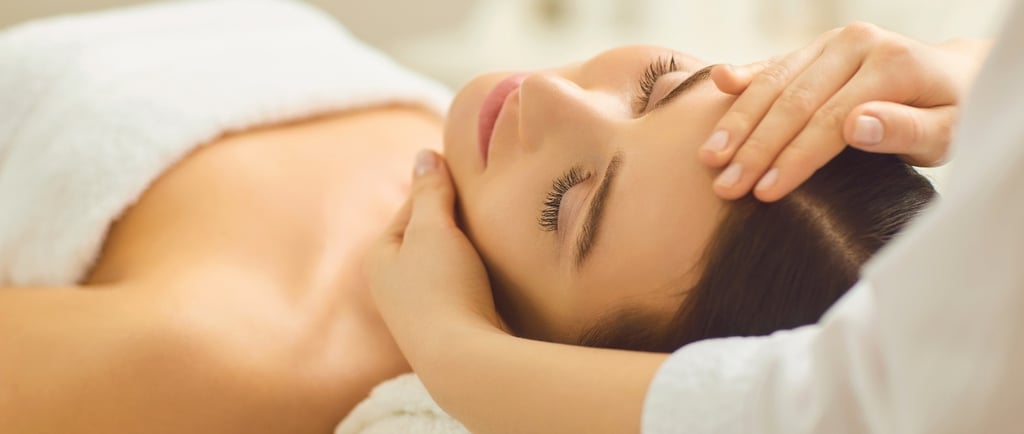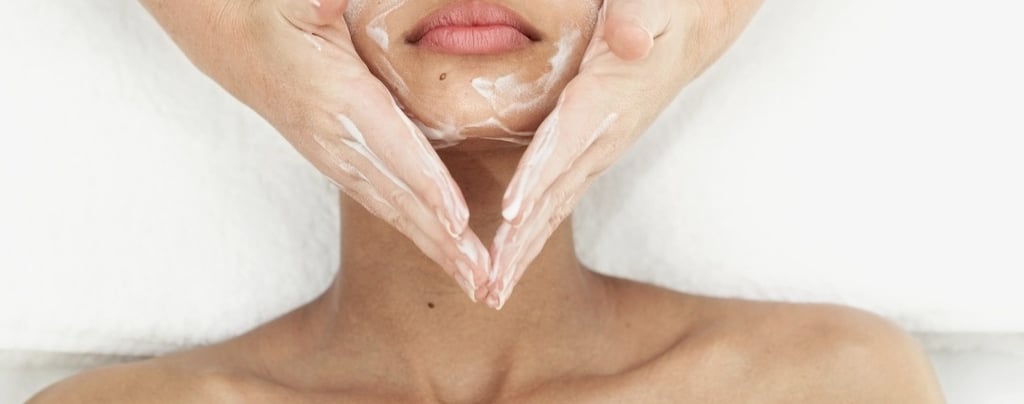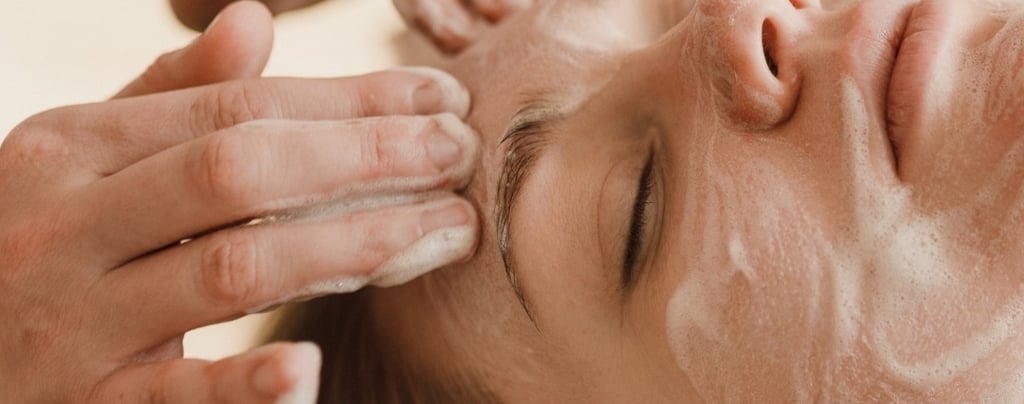The Best Skincare for Acne-Prone Skin After a Facial: What to Use and Avoid
After a facial, especially if it's designed to address acne-prone skin, your skin is often in a more sensitive state. The treatment may have removed impurities, exfoliated dead skin cells, and possibly even extracted blackheads, leaving your skin in need of the right products to heal and maintain a clear complexion. To ensure your skin continues to improve after the facial and doesn't experience breakouts or irritation, it's essential to use the right skincare products and avoid ingredients that may cause inflammation or clog pores. Here’s a guide to the best skincare for acne-prone skin after a facial
7/9/20254 min read


What to Use After a Facial for Acne-Prone Skin:
Gentle Cleanser
Why: After a facial, your skin may be sensitive, so it’s important to use a gentle, non-stripping cleanser that will clean your skin without irritating it.
What to Look For: Choose a mild, non-foaming cleanser, preferably formulated for acne-prone or sensitive skin. Look for gentle ingredients like ceramides, hyaluronic acid, and glycerin that hydrate and replenish the skin.
Recommended Products:
CeraVe Hydrating Cleanser
Vanicream Gentle Facial Cleanser
La Roche-Posay Toleriane Hydrating Gentle Cleanser
Soothing Toner
Why: After a facial, a toner can help calm the skin and balance its pH level. A soothing toner can prevent irritation and maintain hydration.
What to Look For: Opt for toners that contain witch hazel, rose water, or aloe vera for their calming properties. Avoid toners with alcohol or astringents that can dry out the skin.
Recommended Products:
Paula’s Choice Skin Recovery Calming Toner
Thayers Witch Hazel Aloe Vera Formula
Kiehl’s Calendula Herbal Extract Alcohol-Free Toner
Hydrating Serum
Why: Post-facial skin often feels dry or tight. Hydrating serums can restore moisture and keep the skin balanced.
What to Look For: Use serums with hyaluronic acid, niacinamide, or glycerin. These ingredients provide moisture without clogging pores. Niacinamide is particularly beneficial for acne-prone skin because it helps with inflammation and regulates oil production.
Recommended Products:
The Ordinary Hyaluronic Acid 2% + B5
La Roche-Posay Mela-D Pigment Control Serum (contains niacinamide)
Vichy Minéral 89 Hyaluronic Acid Serum
Non-Comedogenic Moisturizer
Why: Even acne-prone skin needs moisture to maintain its protective barrier and prevent excess oil production, which can worsen acne.
What to Look For: Choose a non-comedogenic moisturizer that is oil-free and lightweight. Look for formulations that include ceramides and glycerin to strengthen the skin's barrier and lock in moisture.
Recommended Products:
Neutrogena Hydro Boost Water Gel
Cetaphil PRO Oil Absorbing Moisturizer
EltaMD AM Therapy Moisturizer
Sunscreen
Why: After a facial, your skin is often more vulnerable to sun damage, especially if exfoliation or extraction was involved. Sunscreen is a must to protect your skin from harmful UV rays.
What to Look For: Choose a non-comedogenic, broad-spectrum sunscreen with SPF 30 or higher. Look for options that are specifically formulated for sensitive or acne-prone skin.
Recommended Products:
EltaMD UV Clear Broad-Spectrum SPF 46
La Roche-Posay Anthelios Clear Skin SPF 60
Neutrogena Clear Face Sunscreen SPF 55


What to Avoid After a Facial for Acne-Prone Skin:
Harsh Exfoliants
Why to Avoid: After a facial, your skin is more delicate, and harsh exfoliants (such as physical scrubs with large beads) can lead to irritation, redness, and even exacerbate acne. Your skin needs time to heal and regenerate.
What to Look Out For: Avoid physical scrubs, chemical exfoliants with high levels of AHAs or BHAs, and products with rough exfoliating particles.
Tip: If you must exfoliate, wait for at least a few days after the facial and choose gentle exfoliants like lactic acid or salicylic acid at low concentrations.
Strong Retinoids or Vitamin A Products
Why to Avoid: While retinoids are beneficial for acne-prone skin, they can be very irritating after a facial, especially if your skin is still recovering from exfoliation or extractions. Using retinoids too soon can cause dryness, peeling, or further irritation.
What to Look For: Avoid retinol, tretinoin, and high-concentration vitamin A products immediately following a facial.
Tip: You can resume use of retinoids about a week after the facial when your skin has fully healed.
Fragrance or Alcohol-Based Products
Why to Avoid: Many skincare products contain artificial fragrances or alcohol, which can irritate and dry out sensitive skin, leading to redness and increased breakouts.
What to Look For: Avoid products with high concentrations of fragrance, especially in the first few days after a facial. Alcohol, particularly in toners or astringents, can be particularly drying.
Tip: Always check the ingredients list for alcohol (like ethyl alcohol) and fragrance or parfum.
Heavy, Oily Products
Why to Avoid: Although your skin might feel dry or tight post-facial, using heavy, greasy creams can clog pores and trigger breakouts. Acne-prone skin requires lightweight, non-comedogenic products.
What to Look For: Avoid thick, occlusive creams or oils unless they are specifically labeled non-comedogenic and formulated for acne-prone skin.
Tip: Stick to lightweight, gel-based moisturizers that hydrate without clogging pores.
Exposing Skin to Excessive Heat or Sweat
Why to Avoid: After a facial, your skin is more sensitive to environmental stressors, including heat and sweat. Exposure to hot showers, saunas, or intense physical activity could irritate or inflame your skin.
What to Look For: Try to avoid excessive sweating or hot environments for at least 24–48 hours after the facial to allow your skin time to heal.
Tip: Stay cool and hydrate with water during this period, and avoid activities that could stress your skin.


Final Tips:
Avoid touching your face unnecessarily after a facial, as this can introduce bacteria and oils that could clog pores.
Stick to a simple routine in the days following the facial, focusing on hydration and gentle care to allow your skin to recover.
Consistency is key: Continue using acne-fighting ingredients (like salicylic acid or benzoyl peroxide) as part of your regular skincare routine, but avoid introducing them too soon after the facial.
By using the right products and avoiding irritants, you can maintain clear, balanced skin after a facial and keep your acne under control. Always listen to your skin, and if irritation occurs, give your skin extra time to rest and recover.
Facial Bangkok
Discover top-notch treatments for ultimate facial rejuvenation in Bangkok - Thailand.
Guide
© 2024. All rights reserved. Designed by Pimclick SEO Agency
Article
